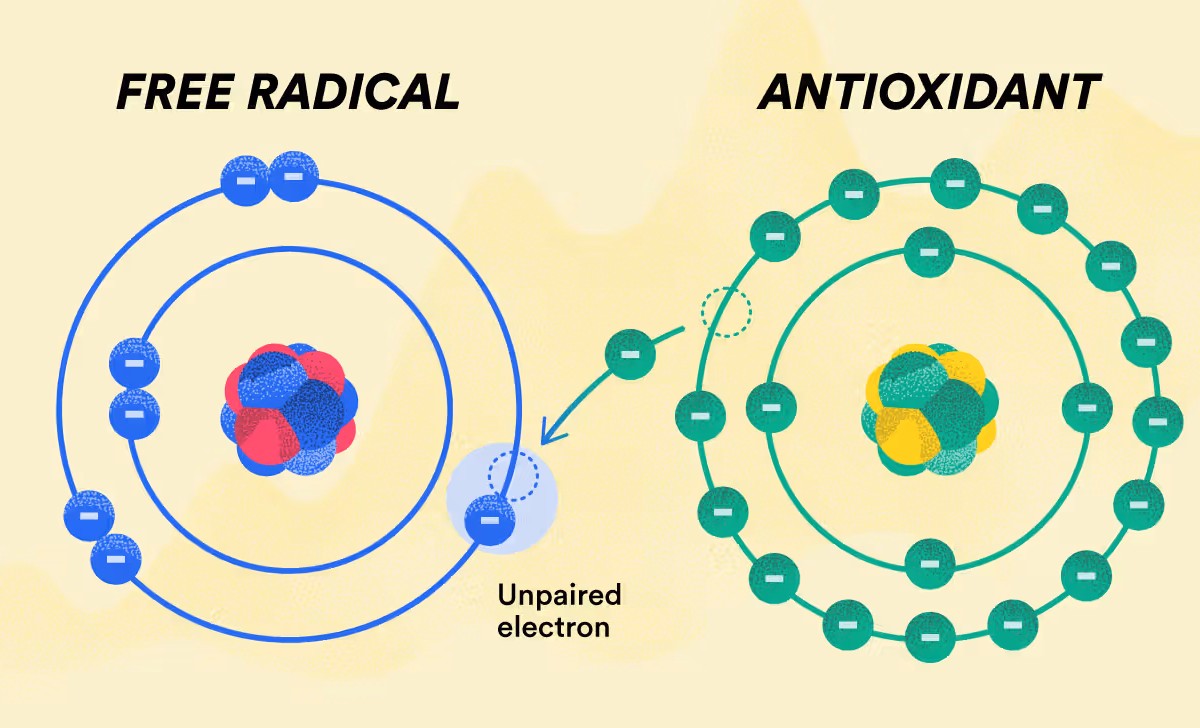
Free radicals are tiny molecules that can cause big problems. They’re like the bullies of the molecular world, always looking to steal electrons from other molecules. This can lead to cell damage, aging, and even diseases like cancer. But not all free radicals are bad. Our bodies actually produce them to fight off infections. The key is balance. Too many free radicals can overwhelm our body's defenses, leading to oxidative stress. Antioxidants, found in fruits and vegetables, help neutralize these troublemakers. Curious about how free radicals affect your health and what you can do about it? Keep reading to find out!
What Are Free Radicals?
Free radicals are unstable molecules that can damage cells, leading to aging and diseases. They are produced naturally in the body but can also come from external sources like pollution and radiation.
- Free radicals are atoms or molecules with an unpaired electron, making them highly reactive.
- They are a natural byproduct of normal metabolic processes in the body.
- External sources like cigarette smoke, pollution, and UV radiation can increase free radical production.
- Free radicals can damage DNA, proteins, and cell membranes, leading to various diseases.
- The body uses antioxidants to neutralize free radicals and minimize their harmful effects.
How Do Free Radicals Affect Health?
Understanding the impact of free radicals on health can help in making better lifestyle choices. These molecules are linked to several chronic conditions and aging.
- Oxidative stress occurs when there is an imbalance between free radicals and antioxidants.
- Chronic oxidative stress can lead to inflammation, which is a root cause of many diseases.
- Free radicals are implicated in the development of cancer by causing mutations in DNA.
- They play a role in cardiovascular diseases by damaging blood vessels and promoting plaque formation.
- Neurodegenerative diseases like Alzheimer's and Parkinson's are associated with oxidative damage in the brain.
Sources of Free Radicals
Knowing where free radicals come from can help in reducing exposure and mitigating their harmful effects. Both internal and external sources contribute to free radical formation.
- Metabolic processes like respiration and energy production generate free radicals.
- Physical exercise increases free radical production, but also boosts antioxidant defenses.
- Environmental pollutants like smog and industrial chemicals are significant sources.
- Radiation from the sun and medical imaging can produce free radicals.
- Certain foods, especially those high in fats and sugars, can increase free radical levels.
Antioxidants: The Free Radical Fighters
Antioxidants are molecules that can donate an electron to free radicals without becoming unstable themselves. They play a crucial role in protecting the body from oxidative damage.
- Vitamins C and E are well-known antioxidants that help neutralize free radicals.
- Selenium, a trace mineral, is essential for the function of antioxidant enzymes.
- Phytochemicals in fruits and vegetables, like flavonoids and carotenoids, have antioxidant properties.
- The body produces its own antioxidants, such as glutathione and superoxide dismutase.
- A diet rich in antioxidants can help reduce the risk of chronic diseases linked to oxidative stress.
Lifestyle Choices to Combat Free Radicals
Making informed lifestyle choices can significantly reduce the impact of free radicals on health. Simple changes can make a big difference in oxidative stress levels.
- Eating a balanced diet rich in fruits, vegetables, and whole grains provides essential antioxidants.
- Regular physical activity boosts the body's natural antioxidant defenses.
- Avoiding smoking and limiting alcohol consumption can reduce free radical exposure.
- Using sunscreen and protective clothing minimizes UV radiation damage.
- Managing stress through techniques like meditation and yoga can lower oxidative stress.
The Role of Free Radicals in Aging
Free radicals are closely linked to the aging process. Understanding their role can help in adopting strategies to slow down aging and maintain health.
- The free radical theory of aging suggests that accumulated oxidative damage leads to aging.
- Skin aging, including wrinkles and age spots, is accelerated by free radical damage.
- Mitochondrial dysfunction caused by oxidative stress contributes to age-related decline.
- Antioxidant-rich skincare products can help protect the skin from free radical damage.
- Caloric restriction has been shown to reduce oxidative stress and extend lifespan in some studies.
Future Research on Free Radicals
Ongoing research continues to uncover new insights into free radicals and their impact on health. Future discoveries may lead to innovative treatments and preventive measures.
- Scientists are exploring the role of free radicals in immune system function.
- New antioxidant compounds are being developed to target specific types of free radicals.
Final Thoughts on Free Radicals
Free radicals are tiny but mighty players in our bodies. They can cause damage but also play a role in essential processes. Understanding them helps us make better choices for our health. Antioxidants, found in fruits and veggies, are our best defense. They neutralize free radicals, reducing potential harm. A balanced diet rich in antioxidants can keep these molecules in check. Exercise, while beneficial, can increase free radicals, so it's important to recover properly. Pollution and smoking also boost free radicals, so avoiding these can help. Knowledge about free radicals empowers us to live healthier lives. Stay informed, eat well, and protect yourself from unnecessary exposure. This way, you can harness the good and minimize the bad effects of free radicals.
Was this page helpful?
Our commitment to delivering trustworthy and engaging content is at the heart of what we do. Each fact on our site is contributed by real users like you, bringing a wealth of diverse insights and information. To ensure the highest standards of accuracy and reliability, our dedicated editors meticulously review each submission. This process guarantees that the facts we share are not only fascinating but also credible. Trust in our commitment to quality and authenticity as you explore and learn with us.
